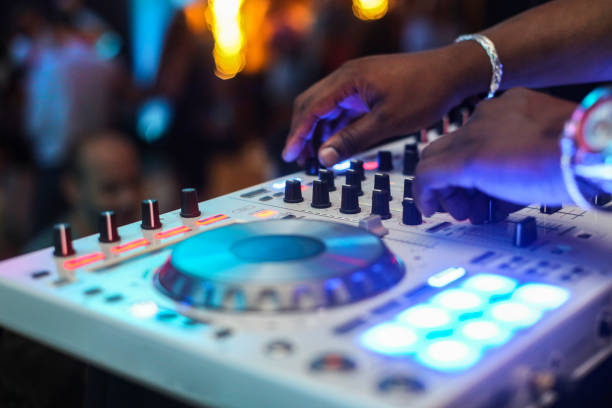
Have you ever found yourself at a party or a club, feeling the beat and the rhythm of the music and thinking, “I wish I could do that?” Well, that feeling could be the beginning of your journey to becoming a DJ in Nigeria. In recent years, DJing has become a popular and highly sought after profession in Nigeria. With its vibrant music culture, Nigeria offers a fantastic platform for aspiring DJs to showcase their skills and make a name for themselves.
If you’re interested in starting your DJ journey, you’ve come to the right place. This article will take you through the steps you need to follow to become a successful DJ in Nigeria. Whether you’re a beginner or someone with some experience, you’ll find helpful tips and insights that will help you on your way.
Before we dive into the steps, let’s take a moment to talk about why DJing can be such a rewarding profession. Being a DJ means you get to be the life of the party, creating an atmosphere that people will remember for a long time. It’s an opportunity to use your love for music to bring people together and create unforgettable experiences. If you’re creative and have a passion for music, DJing could be the perfect career for you.
So, if you’re ready to take the first step towards becoming a successful DJ in Nigeria, let’s get started!
DJ Equipment
The first step in becoming a DJ is to get the right equipment. Essential DJ equipment includes a DJ controller or mixer, a laptop or computer, DJ software, DJ headphones, and DJ speakers.
For beginners, a DJ controller is a great place to start as it provides a simple and easy-to-use interface for mixing and controlling your music. Some popular DJ controllers include the Pioneer DDJ-SB3, the Numark Mixtrack Pro 3, and the Denon DJ MC4000.
A laptop or computer is necessary for running your DJ software, which is the backbone of your DJ setup. Popular DJ software options include Serato DJ Pro, Traktor Pro 3, and Virtual DJ.
DJ headphones are essential for beatmatching, the process of matching the beats of two songs to create a seamless transition between them. A good pair of DJ headphones should have good sound quality, a comfortable fit, and good noise isolation. Some popular DJ headphones include the Pioneer HDJ-X7, the Sennheiser HD 25, and the Audio-Technica ATH-M50x.
Finally, DJ speakers are necessary for playing your music out loud. They should have good sound quality, be loud enough to fill the room, and be portable for easy transport to events. Some popular DJ speakers include the JBL PRX800, the QSC K12.2, and the Mackie Thump12.
Optional DJ equipment includes DJ lightshows, DJ effects units, and DJ microphones. These items are not essential but can help to enhance your DJ performances and make them more visually and sonically dynamic.
DJ Skills
In addition to having the right equipment, there are several skills you’ll need to master in order to become a successful DJ.
Music theory is a critical component of DJing, including understanding different musical genres and the elements that make them unique.
You should also have a basic understanding of musical keys and beats per minute (BPM), as this will help you to seamlessly transition between different songs.
Mixing skills are crucial for a successful DJ performance. This includes beatmatching, crossfading, and scratching. Beatmatching is the process of matching the beats of two songs to create a seamless transition.
Crossfading involves blending two songs together by adjusting the volume levels. Scratching involves moving a record back and forth to create a scratchy sound.
Performance skills are just as important as technical skills when it comes to DJing. You need to be able to interact with your audience, read the crowd, and know what they want to hear. MCing is also an important skill, as it involves talking to the crowd, making announcements, and building a connection with them.
DJ Education
There are several ways to educate yourself on the art of DJing. Online DJ courses, DJ workshops and classes, and hands-on experience are all great ways to learn and improve your DJ skills.
Online DJ courses are a great option for those who prefer to learn at their own pace. Platforms such as Udemy and Coursera offer a wide range of DJ courses that cover everything from basic mixing techniques to advanced music production.
DJ workshops and classes are ideal for those who prefer a more structured learning environment. These can be found in music schools or through local DJ schools, and they often provide hands-on experience with equipment and software.
Finally, hands-on experience is one of the most valuable ways to learn how to DJ. Start by practicing at home, experimenting with different music genres and mixing techniques. You can also attend local DJ events and observe how other DJs perform and interact with the crowd.
Building Your DJ Career
Once you have the right equipment and skills, it’s time to start building your DJ career.
Start by creating a demo mix that showcases your mixing skills, musical taste, and performance skills. Share your demo mix on social media platforms such as Soundcloud and Mixcloud to get noticed by potential fans and clients.
Next, start playing at local events and clubs. Offer to DJ for free or for a low fee to gain exposure and build your reputation. As your reputation grows, you’ll start to get paid gigs and be able to charge higher fees for your services.
Finally, network with other DJs and industry professionals. Attend DJ events and conferences, join DJ forums and Facebook groups, and connect with DJs on social media. Building relationships with other DJs can lead to collaboration opportunities, gigs, and a supportive community.
How Much Do DJs earn in Nigeria?
DJs in Nigeria can earn anywhere from a few thousand naira to several hundred thousand naira, depending on several factors such as experience, popularity, and type of event.
An entry-level DJ just starting out can expect to earn around NGN 20,000 to NGN 50,000 per gig. As their experience and reputation grow, they can expect to earn anywhere from NGN 100,000 to NGN 500,000 per gig.
Top-tier DJs with a large following and a proven track record can earn well over NGN 1 million per gig.
Conclusion
Becoming a DJ in Nigeria requires the right equipment, skills, and education, but with dedication and hard work, anyone can turn their passion for music into a successful DJ career. So, if you’re ready to start your journey to becoming a DJ, get started today and never look back!



